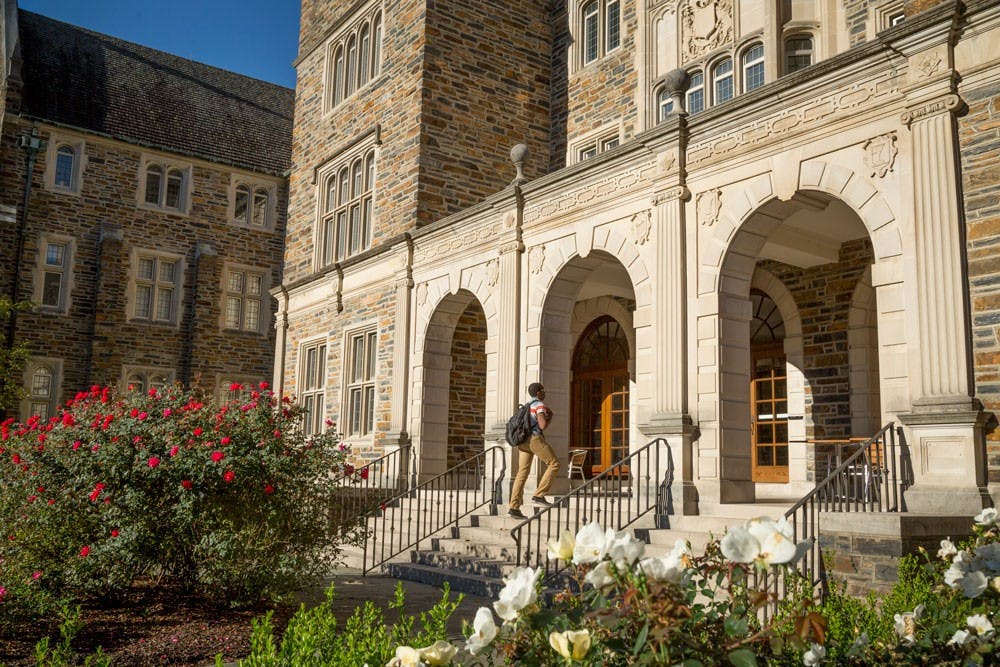Academic Council heard a proposal from the Duke-Margolis Center for Health Policy to transition to a University institute, which center leaders say will improve its external reputation and enhance recruitment of faculty members.
The proposal was presented to the council by Mark McClellan, director of the Duke-Margolis Center and Gillian Schmidler, the center’s deputy director.
The center’s mission, according to McClellan, is to “improve health equity and the value of health care through practical, innovative and evidence based policy solutions.” McClellan said that converting the Duke-Margolis Center into an institute would “elevate [its] standing to be equal to peer institutions across the country.”
Doing so would help the center recruit and retain faculty who “all consider institute-level programs elsewhere,” as well as reintroduce Duke-Margolis as a “partner” for Duke faculty, McClellan said.
In order to become an institute at Duke, a center must meet seven criteria: achieve a critical mass of faculty engagement, attain a substantial educational footprint, cultivate deep linkages to external partners and communities, effectively partner with core Duke units, develop a robust plan for furthering the University’s goals of diversity, equity and inclusion, show strategic significance for the University and identify opportunities for external fundraising.
McClellan said that the Duke-Margolis Center has satisfied all of these criteria.
According to the proposal presented to the council, faculty members affiliated with the center come from the School of Medicine, the Sanford School of Public Policy, the Fuqua School of Business, Trinity College and the Pratt School of Engineering, along with other units at the University.
Schmidler added that the center has 85 faculty members, and that the center has helped bring 11 of them to Duke through joint recruitment efforts with other schools and departments.
“We expect to continue these academic collaborations across Duke, and we received recently a $10 million endowment gift from the Margolis family foundation that can support future joint recruitments, research programs and education programs,” Schmidler said.
Schmidler said that there would be no change in financial commitment from the University to center, if it is approved to become an institute.
Educational initiatives at Duke-Margolis “support students across Duke with interests in health policy and reform at the undergraduate, graduate and postdoc levels,” Schmidler said. She pointed to the Margolis Scholars program for undergraduates and graduate students, a new undergraduate certificate in health policy and sponsorship of Bass Connections teams as examples.
“Our early graduates from our educational programs include three Rhodes Scholars and emerging reform leaders across the public and private sectors,” Schmidler said. “We're excited about what's next for health policy across Duke and our transition to a University-wide institute will be a great opportunity to further our collaborative work.”
According to the proposal, the center has an “active project award portfolio” of $20.4 million. The center’s presence has also played a role in helping its core faculty secure over $49 million in research grants housed in their home departments.
Those core faculty members have also collaborated in the public and private sectors, according to the proposal, including at federal and state-level governments.
Kerry Haynie, dean of the social sciences and professor of political science, asked McClellan about the Duke-Margolis Center’s relationship with the Duke Global Health Institute. McClellan said that the center has a number of joint programs with DGHI.
Gavin Yamey, associate director for policy at DGHI, said that the work of DGHI and the Duke-Margolis Center is “highly complementary,” and that the two units have collaborated on a number of projects.
Associate Professor of History Adriane Lentz-Smith was concerned that the center does not engage with Trinity College faculty as much as it does with faculty in other schools.
Schmidler responded, saying that the center is working with Dean of Trinity College Gary Bennett on how to better engage with Trinity faculty. She added that to do so, one objective is to learn about the incentive systems that matter to different faculty groups across the University.
“Is it faculty research support? Is it salary support? Is it actual research funds? Is it supported students? Is it summer salary, is it funding for sabbatical?” Schmidler listed as possible incentives.
Lentz-Smith also asked about the center’s DEI efforts.
Get The Chronicle straight to your inbox
Sign up for our weekly newsletter. Cancel at any time.
Schmidler said that although DEI work is an ongoing process, the center has made strides by hiring a full time human resources specialist and “monitoring the equity” among different roles within the center.
The council will vote on the proposal to turn the Duke-Margolis Center into an institute in November.

Adway S. Wadekar is a Trinity junior and former news editor of The Chronicle's 119th volume.

